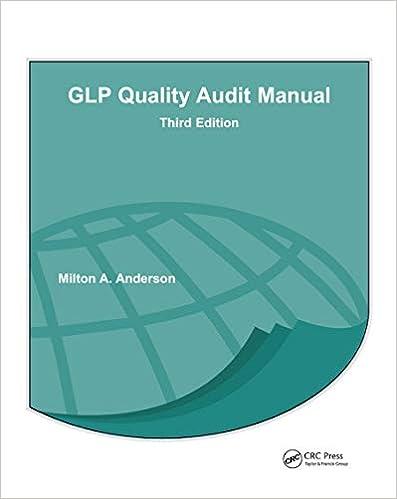Question
QUESTION 1 On January 1 a company had accounts receivable of $20,000. During the year the company sold $100,000 of merchandise to credit customers. At
QUESTION 1
-
On January 1 a company had accounts receivable of $20,000. During the year the company sold $100,000 of merchandise to credit customers. At December 31 the company had accounts receivable of $50,000. How much cash did the company collect from credit customers during the year?
$130,000
$120,000
$100,000
$70,000
2.5 points
QUESTION 2
-
Positive cash flow from financing activities on the statement of cash flows means that a company has:
collected more from customers that it paid for operating expenses.
Borrowed more than it is paying off.
Paid a large cash dividend to shareholders.
Sold more property, plant and equipment than it purchased.
2.5 points
QUESTION 3
-
The following information is available for two different retailers, both of whom began business this year:
Cash flows from: Gnu Co. Lube Co. Operating Activities $(50,000) $ 60,000 Investing Activities 30,000 (90,000) Financing Activities 40,000 50,000 Net Increase in Cash $ 20,000 $ 20,000 Which company would you expect to have future financial troubles?
Both Gnu Co. and Lube Co.
Gnu Co.
Lube Co.
Neither Gnu Co. nor Lube Co.
2.5 points
QUESTION 4
-
A gain or loss from discontinued operations is treated on the income statement as a:
separate line item before taxes.
part of regular income from operations for the period.
separate line item net of taxes.
separate line item called other revenues and expenses.
2.5 points
QUESTION 5
-
Which of the following could be classified as an extraordinary item?
A loss from a hurricane in Florida.
A loss from a plane crash by an airline.
A takeover of a business segment by a foreign government.
A loss from embezzlement by an employee.
2.5 points
QUESTION 6
-
Corporate governance:
prevents fraud and ensures financial statements are prepared in accordance with GAAP.
is the process carried out by the board of directors to provide direction and oversight on behalf of the stakeholders.
is the new concept that arose as a result of the accounting scandals in the early 2000's.
is required by the SEC in accordance with the 1933 and 1934 securities acts.
2.5 points
QUESTION 7
-
The SOX Act requires:
the CEO and CFO to certify the annual financial statements.
the external auditors to prepare, as well as audit, their client's financial statements.
executive compensation no longer be tied to earnings.
financial statements be audited by two independent external auditors each year.
QUESTION 8
-
All of the following can be found in the notes except:
segment information.
accounting changes.
events subsequent to the balance sheet date.
management's plans for the future.
contingencies and commitments.
QUESTION 9
-
A corporation reported the following in their balance sheet:
Common stock, $1 par, 100,000 shares authorized, ? shares issued $ 40,000 Additional paid-in-capital 160,000 Retained Earnings 100,000 Treasury Stock (1,000 shares at cost) (6,000) Total shareholders' equity $294,000 What is the average price paid by the stockholders for a share of common stock?
$6.00
$7.35
$5.00
$1.00
QUESTION 10
-
How many of these will decrease a corporation's retained earnings?
- a stock split
- declaring a stock dividend
- net income
- buying treasury stock
- a prior period adjustment (prior income was overstated)
One
Two
Three
Four
Five
Step by Step Solution
There are 3 Steps involved in it
Step: 1

Get Instant Access to Expert-Tailored Solutions
See step-by-step solutions with expert insights and AI powered tools for academic success
Step: 2

Step: 3

Ace Your Homework with AI
Get the answers you need in no time with our AI-driven, step-by-step assistance
Get Started


